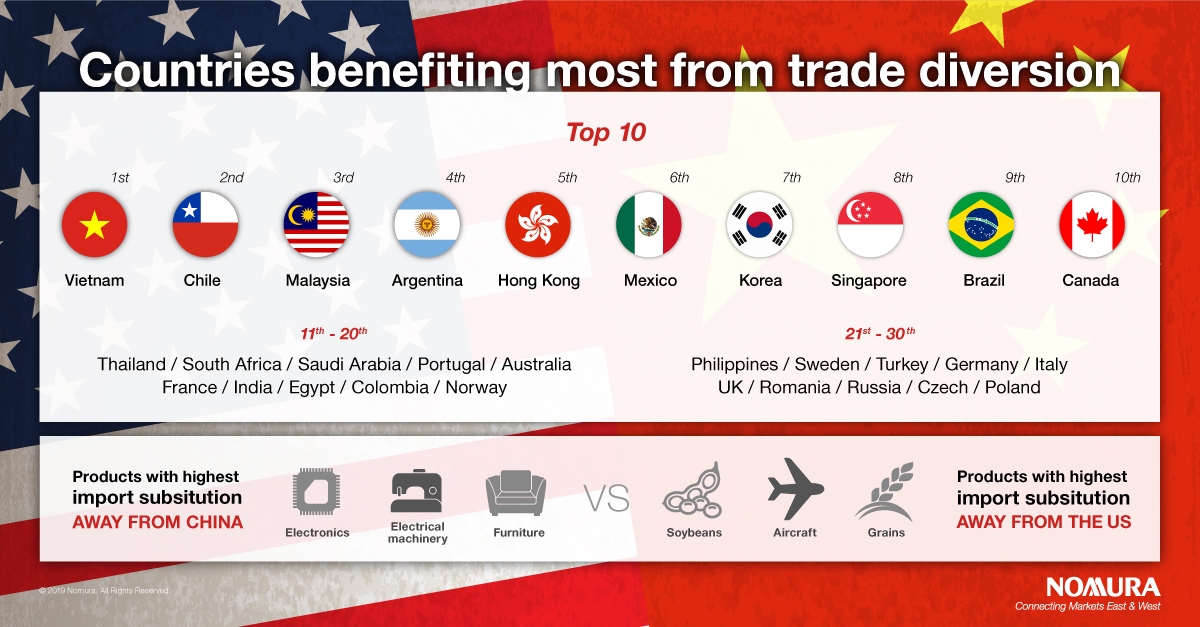US-China Trade Diversion: Who Benefits?
- As tariff hikes between the US and China increase, the diversion of imports away from each other benefits third-party countries
- Vietnam is the largest beneficiary; we estimate it could gain 7.9% of GDP from trade diversion
- US tariffs on China have resulted in US import substitution in electronic products, furniture and travel goods, while China’s tariffs on the US have resulted in China import substitution mostly in soybeans, aircraft, grains and cotton
The ongoing and escalating US-China trade friction is no doubt negative for the world economy. As tit-for-tat tariff hikes between the US and China increase, so does the cost of importing from each other. However, there is a silver lining: the two countries diverting imports away from each other potentially benefits industries in different economies, making suppliers in the rest of the world more competitive relative to US and Chinese firms.
Trade literature finds that substitution between any two foreign suppliers is easier than substitution between a foreign supplier and a domestic firm. This substitution effect may be small in relation to the sizes of US and China’s GDP but the benefit from trade diversion can represent a substantial boost to the exports of third-party countries with smaller economies and can be even more substantial for particular industries within these third countries.
Countries benefitting the most from trade diversion
Vietnam is by far the largest beneficiary, gaining 7.9% of GDP from trade diversion, where trade diversion is mostly additional US imports. For the next top three, Chile, Malaysia and Argentina, the trade diversion is mostly additional China imports. In aggregate, third-party countries benefitted more from US import substitution than from China import substitution.
Asia’s global value chain (excluding China) has gained more from US import substitution, while Americas (excluding the US) has benefitted more from China import substitution. The biggest beneficiary in Europe is France, but the overall benefit in the region is small.
Products experiencing the most trade diversion
Over the past year, Vietnam and Korea have gained from US import substitution in electrical appliances, Malaysia has benefitted from semiconductors and Mexico, from motor vehicles. On the other hand, for China tariffs (on the US), the products in which third countries benefit most from China import substitution are mostly in agricultural and other commodities such as copper, soybeans, gold, aircraft, grains and cotton.
Overall, the big beneficiaries from trade diversion due to US tariffs on China are located in Asia, but those benefitting from China’s tariffs on US imports are more diversified across the regions.
For more insight on the beneficiaries of the trade diversion, read our full report here.
Contributor

Rob Subbaraman
Head of Global Macro Research

Sonal Varma
Chief Economist, India and Asia ex-Japan

Michael Loo
Macroeconomic Research Analyst, Asia ex-Japan
Disclaimer
This content has been prepared by Nomura solely for information purposes, and is not an offer to buy or sell or provide (as the case may be) or a solicitation of an offer to buy or sell or enter into any agreement with respect to any security, product, service (including but not limited to investment advisory services) or investment. The opinions expressed in the content do not constitute investment advice and independent advice should be sought where appropriate.The content contains general information only and does not take into account the individual objectives, financial situation or needs of a person. All information, opinions and estimates expressed in the content are current as of the date of publication, are subject to change without notice, and may become outdated over time. To the extent that any materials or investment services on or referred to in the content are construed to be regulated activities under the local laws of any jurisdiction and are made available to persons resident in such jurisdiction, they shall only be made available through appropriately licenced Nomura entities in that jurisdiction or otherwise through Nomura entities that are exempt from applicable licensing and regulatory requirements in that jurisdiction. For more information please go to https://www.nomuraholdings.com/policy/terms.html.
